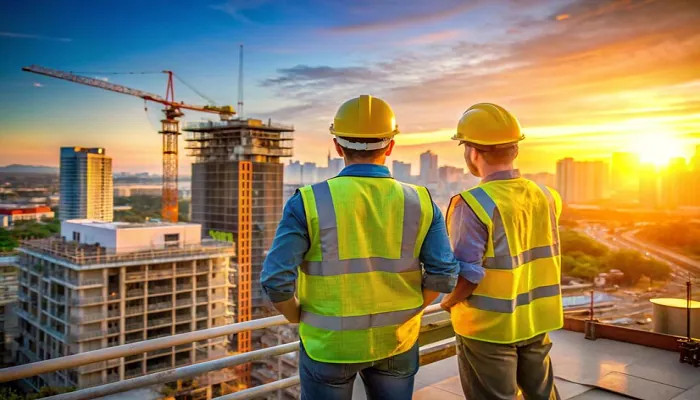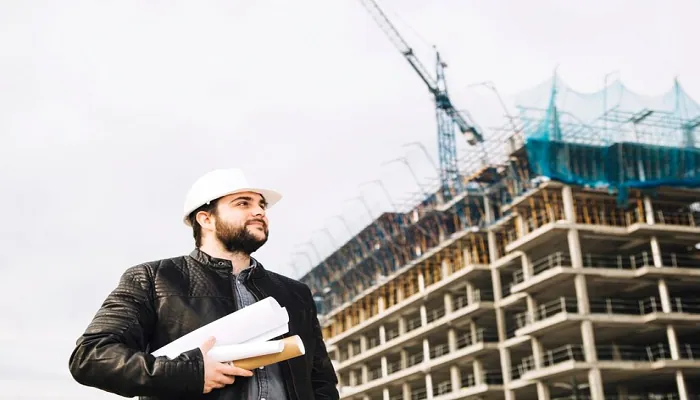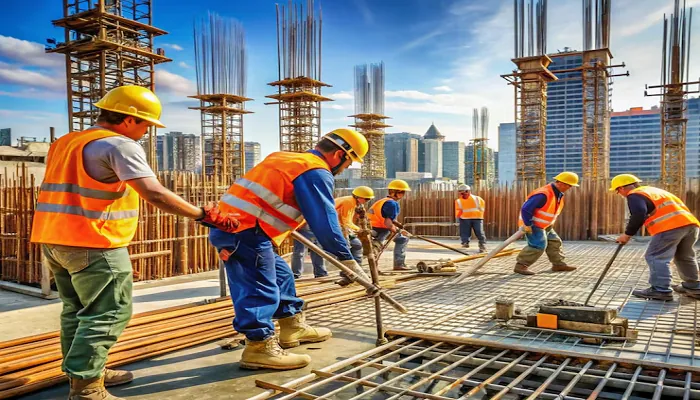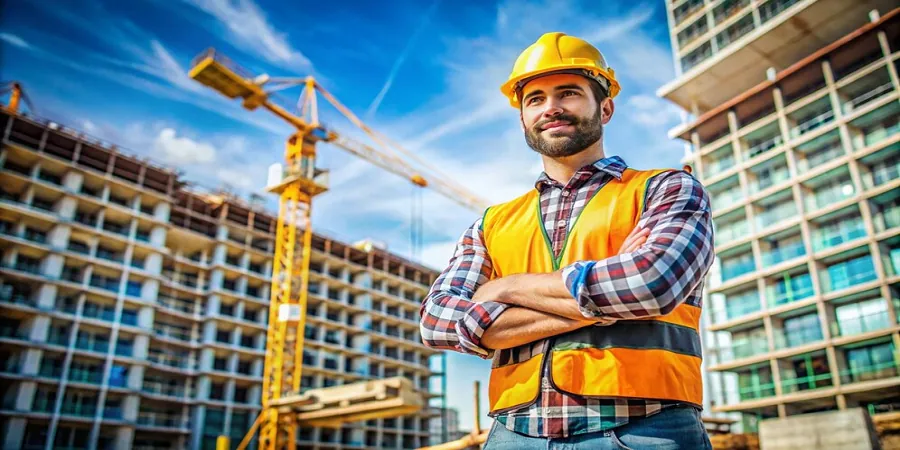Overview of the Role of Professional Builders
Professional builders play a crucial role in the construction industry. They are responsible for turning architectural designs into reality by managing and executing construction projects. Builders are involved in every stage of a building’s development, from laying the foundation to finishing the final details. Their work ensures that buildings are safe, functional, and meet the required standards.
Builders are not limited to just residential homes; they also construct commercial buildings, offices, schools, hospitals, and other structures. They collaborate with architects, engineers, and other construction professionals to bring complex projects to life. Without builders, it would be impossible to complete construction projects efficiently and safely.
Purpose of the Post
The purpose of this post is to explore the various responsibilities, skills, and significance of builders in the construction industry. Professional builders must have a deep understanding of construction techniques, building materials, safety regulations, and project management. This post will highlight the key skills required to become a successful builder, the different types of builders, and the important role they play in ensuring construction projects are completed on time and to a high standard.
By understanding the responsibilities of builders and the challenges they face, homeowners and businesses can make informed decisions when selecting a builder for their projects. Additionally, aspiring builders can learn about the qualifications and skills necessary to succeed in the field. Overall, this post aims to shed light on the importance of professional builders and their contribution to the construction industry.
Types of Builders

Residential Builders
Residential builders specialize in constructing homes and housing projects. These professionals work on single-family homes, apartment complexes, and other residential buildings. Their primary focus is on creating living spaces that are safe, comfortable, and meet the needs of homeowners. Residential builders manage the entire process, from laying the foundation to adding the finishing touches. They also handle tasks like plumbing, electrical work, and interior finishing. Residential builders often work closely with homeowners to ensure the final product matches their vision and expectations.
Commercial Builders
Commercial builders focus on constructing buildings for businesses and industries. These projects include offices, retail stores, warehouses, schools, and hospitals. The scope of commercial construction is typically larger and more complex than residential projects, requiring specialized skills and knowledge. Commercial builders must consider factors such as safety regulations, structural integrity, and the specific needs of a business. They also manage larger teams and work with various contractors to ensure the project is completed on time and within budget.
Specialized Builders
Specialized builders focus on niche areas within the construction industry. For example, renovation experts specialize in upgrading or remodeling existing structures. They bring new life to old buildings by improving their functionality, appearance, or energy efficiency. Green builders are another type of specialized builder. They focus on constructing environmentally-friendly buildings that use sustainable materials and energy-efficient systems. Green builders help reduce the carbon footprint of a building by incorporating modern eco-friendly technologies and designs.
In summary, whether you're looking to build a home, a business facility, or an eco-friendly structure, understanding the different types of builders will help you choose the right professionals for your project.
Key Skills and Qualifications

Essential Skills for Professional Builders
Professional builders need a wide range of skills to succeed in the construction industry. First and foremost, technical skills are critical. Builders must know how to read blueprints, understand construction methods, and use various tools and equipment. They also need strong problem-solving abilities to tackle unexpected challenges that arise on the job, such as dealing with delays, material shortages, or design changes.
Attention to detail is another key skill, as builders must ensure every aspect of the construction is accurate and up to safety standards. Good communication skills are important because builders often work with architects, engineers, subcontractors, and clients. They must clearly explain progress, issues, or updates. Finally, time management is crucial, as builders need to meet deadlines and keep projects on schedule.
Certifications and Training
To become a qualified builder, formal education and training are often necessary. Many builders start with a high school diploma or equivalent, followed by an apprenticeship or vocational training in construction. These programs teach the basics of construction techniques, safety practices, and how to use tools.
In many countries, professional builders are required to obtain specific certifications and licenses. For example, in the United States, builders must hold a general contractor’s license, which usually requires passing an exam and having a certain number of years of experience. Additionally, safety certifications such as OSHA (Occupational Safety and Health Administration) training are often required to ensure builders can work in safe environments.
Continuous learning is also important for builders, as construction techniques and technologies are constantly evolving. Staying updated with industry trends, new materials, and modern tools is essential for maintaining a competitive edge.
In conclusion, professional builders need a combination of hands-on skills, certifications, and continuous training to excel in their field.
Responsibilities of Professional Builders

Overseeing Construction Projects from Start to Finish
One of the main responsibilities of professional builders is managing construction projects from the very beginning to the final stages. This means they are involved in every aspect of the project, from planning and organizing to building and completing the structure. Builders are responsible for ensuring that the project stays on track, meets deadlines, and remains within the set budget. This role requires strong project management skills to keep everything running smoothly.
Collaborating with Architects, Engineers, and Subcontractors
Professional builders work closely with a variety of experts to make sure the construction process goes as planned. They collaborate with architects to follow design plans and ensure the building is constructed according to the specifications. Builders also work with engineers to address technical aspects, such as structural integrity and safety. Additionally, they coordinate with subcontractors who handle specialized tasks like plumbing, electrical work, or painting. Good communication and teamwork are essential to keeping everyone on the same page.
Ensuring Compliance with Building Codes and Regulations
Professional builders must ensure that the construction site and project comply with all building codes and regulations. These codes are legal requirements that ensure safety, quality, and efficiency in the construction process. Builders need to understand these regulations and apply them at every stage of the project, from the foundation to the final inspection. This includes making sure materials used are up to standard and that the construction meets safety requirements.
In summary, professional builders have the responsibility of overseeing projects, collaborating with various experts, and ensuring that the building complies with all necessary laws and regulations, ensuring a successful construction outcome.
The Importance of Builders in Construction

Contribution to the Structural Integrity and Design of Buildings
Builders play a vital role in ensuring the structural integrity of buildings. They are responsible for turning the architectural designs into reality by following the construction plans accurately. A building’s strength and stability depend largely on how well the builder follows these designs, using quality materials and proper techniques. Professional builders have the knowledge and skills to make sure that the structure is safe, durable, and built to last. They understand the importance of creating a strong foundation and frame to support the entire building.
Builders also contribute to the design by ensuring that the project aligns with the architect’s vision. Whether constructing a home or a commercial space, builders work carefully to bring the design details to life while maintaining the necessary functionality and aesthetic appeal.
Builders’ Role in Ensuring Project Efficiency and Quality Control
Builders are essential in making sure that construction projects are done efficiently. They organize the work, manage resources like labor and materials, and keep the project on schedule. By coordinating tasks properly, builders help avoid delays, reduce waste, and prevent costly mistakes. This efficiency not only saves time and money but also ensures that the project progresses smoothly.
In addition, builders are responsible for quality control throughout the construction process. They oversee the work being done at every stage, checking that it meets high standards of quality. This includes inspecting materials, monitoring the construction work, and addressing any issues that arise before they become bigger problems. Through careful management and attention to detail, builders ensure that the final result is of the highest quality, meeting both safety requirements and client expectations.
In conclusion, builders are crucial to ensuring the strength, design, and quality of construction projects, making their role invaluable to the industry.
Challenges Faced by Builders

Dealing with Project Delays, Material Shortages, and Client Demands
Builders often face the challenge of project delays caused by various factors, such as unexpected weather conditions, unforeseen technical issues, or delays in the supply of materials. These setbacks can disrupt the construction timeline, making it difficult to complete the project on time. Material shortages are another significant challenge. Builders rely on a steady supply of construction materials to keep the project moving, and any disruption in the supply chain can cause delays and increase costs. Builders must also balance client demands, which can sometimes change during the project. Adjusting plans or making modifications based on client preferences can be time-consuming and add complexity to the project.
Managing Teams and Staying Updated on Construction Trends and Regulations
Effective team management is a crucial aspect of a builder’s job. Builders must manage various skilled workers, such as electricians, plumbers, and carpenters, ensuring they work efficiently and cohesively. Coordinating such a diverse team can be challenging, especially on large construction sites where many tasks need to be done simultaneously. Builders must also address any conflicts that arise and ensure that safety protocols are followed.
Additionally, builders must stay updated on the latest construction trends and regulations. As the construction industry evolves, new building techniques, technologies, and materials emerge. Builders need to continuously learn about these advancements to improve the quality and efficiency of their projects. Moreover, builders must ensure that their work complies with local building codes and safety regulations, which can frequently change. Keeping up with these regulations is vital to avoid legal issues and ensure that the building is safe and up to standard.
In conclusion, builders face several challenges, from managing delays and teams to adapting to changing trends and client needs, making their role both demanding and dynamic.
The Future of Professional Building

Impact of Technology on Construction Methods
The future of professional building is being shaped by advancements in technology. Modern tools like drones, 3D printing, and building information modeling (BIM) are transforming how construction projects are designed and executed. Drones are being used to survey large construction sites quickly and accurately, providing builders with valuable data to plan and monitor projects. 3D printing allows for faster and more cost-effective construction of building components, reducing waste and labor costs. BIM is another revolutionary tool that helps builders visualize entire projects in digital models, making it easier to coordinate with architects and engineers, foresee potential issues, and optimize the construction process. These technologies are improving efficiency, safety, and the quality of construction, paving the way for smarter building practices.
The Rise of Sustainable and Green Building Practices
Another important trend shaping the future of professional building is the rise of sustainable and green building practices. With growing awareness about climate change and the environment, there is an increasing demand for eco-friendly construction methods. Green builders focus on using sustainable materials, reducing energy consumption, and minimizing waste. Buildings are being designed to be more energy-efficient, with features like solar panels, better insulation, and water-saving systems. In some cases, smart technologies are integrated into the buildings to control heating, lighting, and energy usage automatically.
Sustainable construction not only benefits the environment but also reduces long-term costs for homeowners and businesses by lowering energy bills and increasing the durability of buildings. As environmental regulations become stricter and demand for green construction grows, builders who adopt these practices will lead the way in the industry.
In summary, the future of professional building lies in the integration of advanced technology and sustainable practices, creating a more efficient, environmentally conscious, and innovative construction industry.
Tips for Hiring Professional Builders

What to Look for in a Reputable Builder
When hiring a professional builder for your project, it's important to select someone reliable and experienced. Start by looking at the builder’s portfolio to see past projects and get an idea of their skills and expertise. A reputable builder will have a strong track record of completed projects similar to what you need. Communication is key, so find a builder who listens to your requirements and is easy to talk to. Make sure the builder is clear about timelines, costs, and the construction process from the beginning. This will help avoid misunderstandings later on.
The Importance of Experience, Certifications, and Client Reviews
Experience is one of the most important factors when hiring a builder. A highly experienced builder will have the knowledge to handle complex projects and deal with any unexpected challenges. It's also crucial that the builder has the necessary certifications and licenses. These ensure that the builder follows industry standards and building regulations. Certifications like ISO 9001 for quality management or LEED for green building practices can show a higher level of professionalism.
In addition to checking certifications, it's also wise to look at client reviews and testimonials. Positive reviews from previous clients indicate that the builder is reliable and delivers good results. You can ask the builder for references or check online review platforms. Past clients can provide valuable insights into the builder’s work ethic, punctuality, and attention to detail.
In summary, choosing the right professional builder involves assessing their experience, qualifications, and client feedback. Doing thorough research will help ensure that your project is completed to a high standard, on time, and within budget.
In conclusion, builders play a critical role in the success of construction projects. They ensure that buildings are safe, functional, and meet design specifications. Their expertise helps manage timelines, budgets, and quality control throughout the construction process. To achieve the best results, it's essential to hire experienced and certified builders. They bring valuable skills and knowledge that can prevent issues and ensure a smooth project. By choosing the right builder, you can have confidence that your construction project will be completed to a high standard, ultimately leading to a successful outcome.

Comments